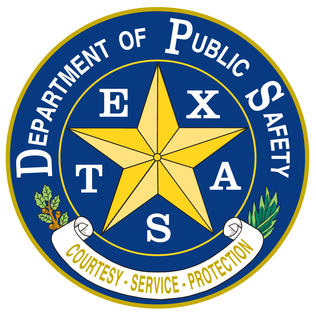Related Research Articles
Drunk driving is the act of operating a motor vehicle with the operator's ability to do so impaired as a result of alcohol consumption, or with a blood alcohol level in excess of the legal limit. For drivers 21 years or older, driving with a blood alcohol concentration (BAC) of 0.08% or higher is illegal. For drivers under 21 years old, the legal limit is lower, with state limits ranging from 0.00 to 0.02. Lower BAC limits apply when operating boats, airplanes, or commercial vehicles. Among other names, the criminal offense of drunk driving may be called driving under the influence (DUI), driving while intoxicated or impaired (DWI), operating [a] vehicle under the influence of alcohol (OVI), or operating while impaired (OWI).

Driving under the influence (DUI) is the offense of driving, operating, or being in control of a vehicle while impaired by alcohol or drugs, to a level that renders the driver incapable of operating a motor vehicle safely. Multiple other terms are used for the offense in various jurisdictions.

A department of motor vehicles (DMV) is a government agency that administers motor vehicle registration and driver licensing. In countries with federal states such as in North America, these agencies are generally administered by subnational entities governments, while in unitary states such as many of those in Europe, DMVs are organized nationally by the central government.

An ignition interlock device or breath alcohol ignition interlock device is a breathalyzer for an individual's vehicle. It requires the driver to blow into a mouthpiece on the device before starting or continuing to operate the vehicle. If the resultant breath-alcohol concentration analyzed result is greater than the programmed blood alcohol concentration, the device prevents the engine from being started. The interlock device is located inside the vehicle, near the driver’s seat, and is directly connected to the engine’s ignition system. It is a form of electronic monitoring.

The Department of Public Safety of the State of Texas, commonly known as the Texas Department of Public Safety (DPS), is a department of the state government of Texas. The DPS is responsible for statewide law enforcement and driver license administration. The Public Safety Commission oversees the DPS. However, under state law, the Governor of Texas may assume command of the department during a public disaster, riot, insurrection, formation of a dangerous resistance to enforcement of law, or to perform his constitutional duty to enforce law. The commission's five members are appointed by the governor and confirmed by the Texas Senate, to serve without pay for staggered, six-year terms. The commission formulates plans and policies for enforcing criminal, traffic and safety laws, preventing and detecting crime, apprehending law violators, and educating citizens about laws and public safety.
DWI courts are a form of court that exists in some United States legal jurisdictions, that use substance-abuse interventions and treatment with defendants who plead guilty of driving while intoxicated or impaired. DUI courts may focus on repeat offenders and drivers with very high levels of blood alcohol at the time of the offense. As of December 2011, there were approximately 192 designated DUI courts in the United States, and approximately 406 drug courts that also accept DUI offenders.
Alice Robie Resnick is an American attorney and jurist who served as a Justice of the Supreme Court of Ohio.
Many countries have adopted a penalty point or demerit point system under which a person’s driving license is revoked or suspended based on the number of points they’ve accumulated over a specific period of time, points are given for traffic offenses or infringements committed by them in that period. The demerit points schemes of each jurisdiction varies. These demerit schemes are usually in addition to fines or other penalties which may be imposed for a particular offence or infringement, or after a prescribed number of points have been accumulated.

A random checkpoint is a military and police tactic. In a military context, checkpoints involve the setup of a hasty roadblock by mobile truck- or armored vehicle-mounted infantry to disrupt unauthorized or unwanted movement or military activity and to check for valid identification and search for contraband, fugitives, or weapons that are not permitted in civilian hands. Random checkpoints are set up to achieve surprise, as opposed to known permanently located checkpoints, which suspects could circumvent. They are often established in locations where they cannot be observed by approaching traffic until it is too late to withdraw and escape without being observed.
The U.S. state of Maryland has various policies regarding the production, sale, and use of different classes and kinds of drugs.
The Highway Traffic Act is a statute in Ontario, Canada, which regulates the licensing of vehicles, classification of traffic offences, administration of loads, classification of vehicles and other transport-related issues. First introduced in 1923 to deal with increasing accidents during the early years of motoring in Ontario, and replacing earlier legislation such as the Highway Travel Act, there have been amendments due to changes to driving conditions and new transportation trends. For example, in 2009, the Act was revised to ban the use of cell phones while driving.
Welsh v. Wisconsin, 466 U.S. 740 (1984), was a 1983 case before the US Supreme Court determining that a warrantless home arrest without exigent circumstances violates the Fourth Amendment protection against unlawful search and seizure.

The state laws governing alcoholic drinks in New Jersey are among the most complex in the United States, with many peculiarities not found in other states' laws. They provide for 29 distinct liquor licenses granted to manufacturers, wholesalers, retailers, and for the public warehousing and transport of alcoholic drinks. General authority for the statutory and regulatory control of alcoholic drinks rests with the state government, particularly the Division of Alcoholic Beverage Control overseen by the state's Attorney General.
Impaired driving is the term used in Canada to describe the criminal offence of operating, having care or the control of a motor vehicle while the person's ability to operate the motor vehicle is impaired by alcohol or a drug. Impaired driving is punishable under multiple offences in the Criminal Code, with greater penalties depending on the harm caused by the impaired driving. It can also result in various types of driver's licence suspensions.
The laws of driving under the influence vary between countries. One difference is the acceptable limit of blood alcohol content before a person is charged with a crime. Thresholds range from the limit of detection (zero-tolerance) to 0.08%. Some countries have no limits or laws on blood alcohol content.

Drunk driving is the act of driving under the influence of alcohol. A small increase in the blood alcohol content increases the relative risk of a motor vehicle crash.

Drug-impaired driving, or drug driving, in the context of its legal definition, is the act of driving a motor vehicle while under the influence of an impairing substance. DUID, or Driving Under the Influence of Drugs, is prohibited in many countries. Several American states and European countries now have "per se" DUID laws that presume a driver is impaired if they are found to have any detectable quantity of controlled substances in their body while operating an automobile and that the driver has no doctor's prescription for the substance. This is similar to the "per se" DUI/DWI laws that presume a driver is impaired when their blood alcohol content is above a certain level. There is some controversy with "per se" DUID laws in that a driver with any detectable quantity of controlled substances may not in fact be impaired and the detectable quantity in blood or sweat may be only the remnants of drug use in days or weeks past. It is against road traffic safety. Research on factors associated with engaging in DUID is receiving increasing attention to develop more effective countermeasures.

Field sobriety tests (FSTs), also referred to as standardized field sobriety tests (SFSTs), are a battery of tests used by police officers to determine if a person suspected of impaired driving is intoxicated with alcohol or other drugs. FSTs are primarily used in the United States, to meet "probable cause for arrest" requirements, necessary to sustain an alcohol-impaired driving conviction based on a chemical blood alcohol test.
Driving under the influence (DUI) occurs when a person operates a motor vehicle while under the influence of drugs or alcohol, or when the driver has a blood alcohol level of 0.08 or greater. Minors and young adults aged 18–20 can be charged with impaired driving based on blood alcohol levels of 0.01 or higher, and CDL license holders can be charged based upon blood alcohol levels of 0.04 or higher.
Birchfield v. North Dakota, 579 U.S. 438 (2016) is a case in which the Supreme Court of the United States held that the search incident to arrest doctrine permits law enforcement to conduct warrantless breath tests but not blood tests on suspected drunk drivers.
References
- ↑ "Arrest for Driving Under the Influence DUI General Information". California Department of Motor Vehicles. Archived from the original on 5 December 2010. Retrieved 15 January 2011.
- ↑ DUI/DWI laws Archived 2013-02-02 at the Wayback Machine , Insurance Institute for Highway Safety, February 2010
- ↑ Goolsby, Mike (2024-02-15). "The Role of Technology in Enhancing Administrative License Suspension Enforcement in Texas". The Goolsby Law Firm. Retrieved 2024-05-07.